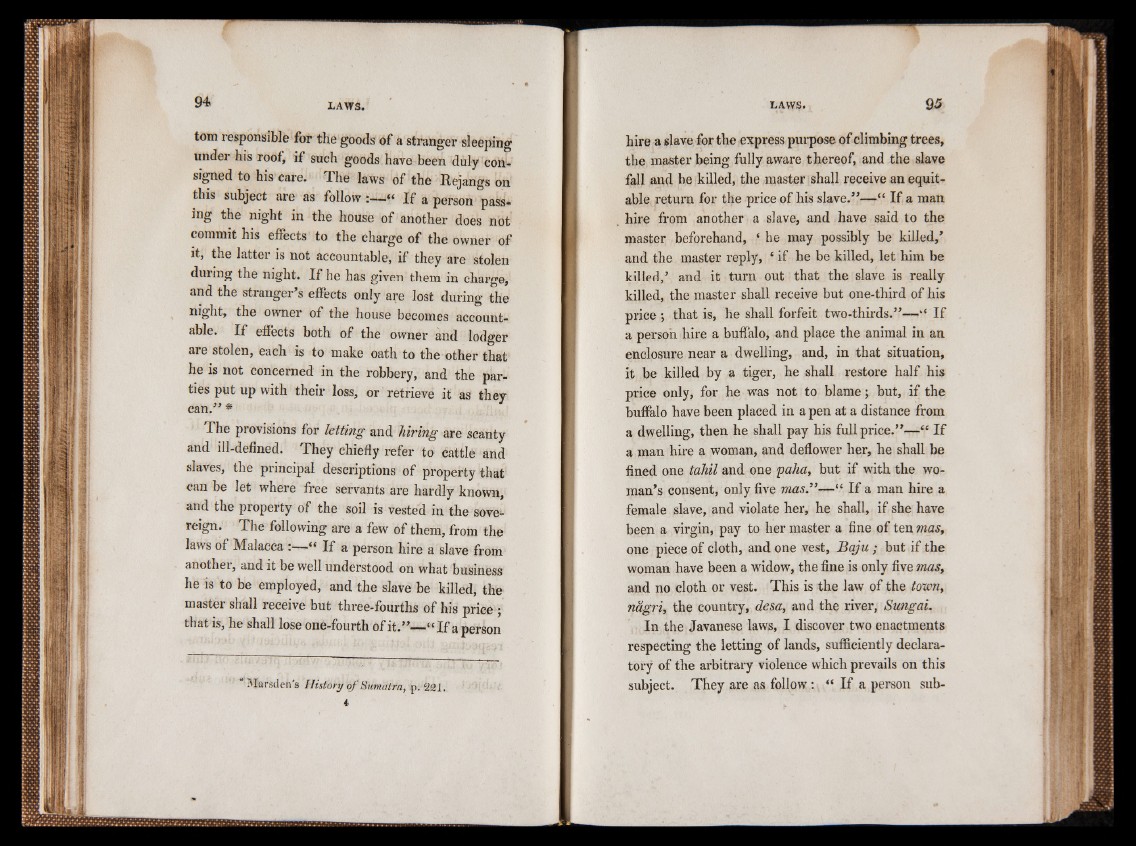
tom responsible for the goods of a stranger sleeping
under his roofi if such goods have been duly consigned
to his care. The laws of the Rejangs on
this subject are as follow :—“ If a person passing
the night in the house of another does not
commit his effects to the charge of the owner of
it, the latter is not accountable, if they are stolen
during the night. If he has given them in charge,
and the stranger’s effects only are lost during the
night, the owner of the house becomes accountable.
If effects both of the owner and lodger
are stolen, each is to make oath to the other that
he is not concerned in the robbery, and the parties
put up with their loss, or retrieve it as they
can.” *
The provisions for letting and hiring are scanty
and ill-defined. They chiefly refer to cattle and
slaves, the principal descriptions of property that
can be let where free servants are hardly known,
and the property of the soil is vested in the sovereign.
The following are a few of them, from the
laws of Malacca : ** If a person hire a slave from
anothei, and it be well understood on what business
he is to be employed, and the slave be killed, the
master shall receive but three-fourths of his price ;
that is, he shall lose one-fourth of it.”—“ If a person
' Marsden’s History o f Sumatra, p. 221. 4
hire a slave for the express purpose of climbing trees,
the master being fully aware thereof, and the slave
fall and be killed, the master shall receive an equitable
return for the price of his slave.”—“ If a man
hire from another a slave, and have said to the
master beforehand, ‘ he may possibly be killed,’
and the master reply, ‘ if he be killed, let him be
killed,’ and it turn out that the slave is really
killed, the master shall receive but one-third of his
price ; that is, he shall forfeit two-thirds.”—*« If
a person hire a buffalo, and place the animal in an
enclosure near a dwelling, and, in that situation,
it be killed by a tiger, he shall restore half his
price only, for he was not to blame; but, if the
buffalo have been placed in a pen at a distance from
a dwelling, then he shall pay his full price.”—“ If
a man hire a woman, and deflower her, he shall be
fined one tahil and one paha, but if with the woman’s
consent, only five mas.”—“ If a man hire a
female slave, and violate her, he shall, if she have
been a virgin, pay to her master a fine of ten mas,
one piece of cloth, and one vest, Baju ; but if the
woman have been a widow, the fine is only five mas,
and no cloth or vest. This is the law of the town,
nagri, the country, desa, and the river, Sungai.
In the Javanese laws, I discover two enactments
respecting the letting of lands, sufficiently declaratory
of the arbitrary violence which prevails on this
subject. They are as follow : “ If a person sub